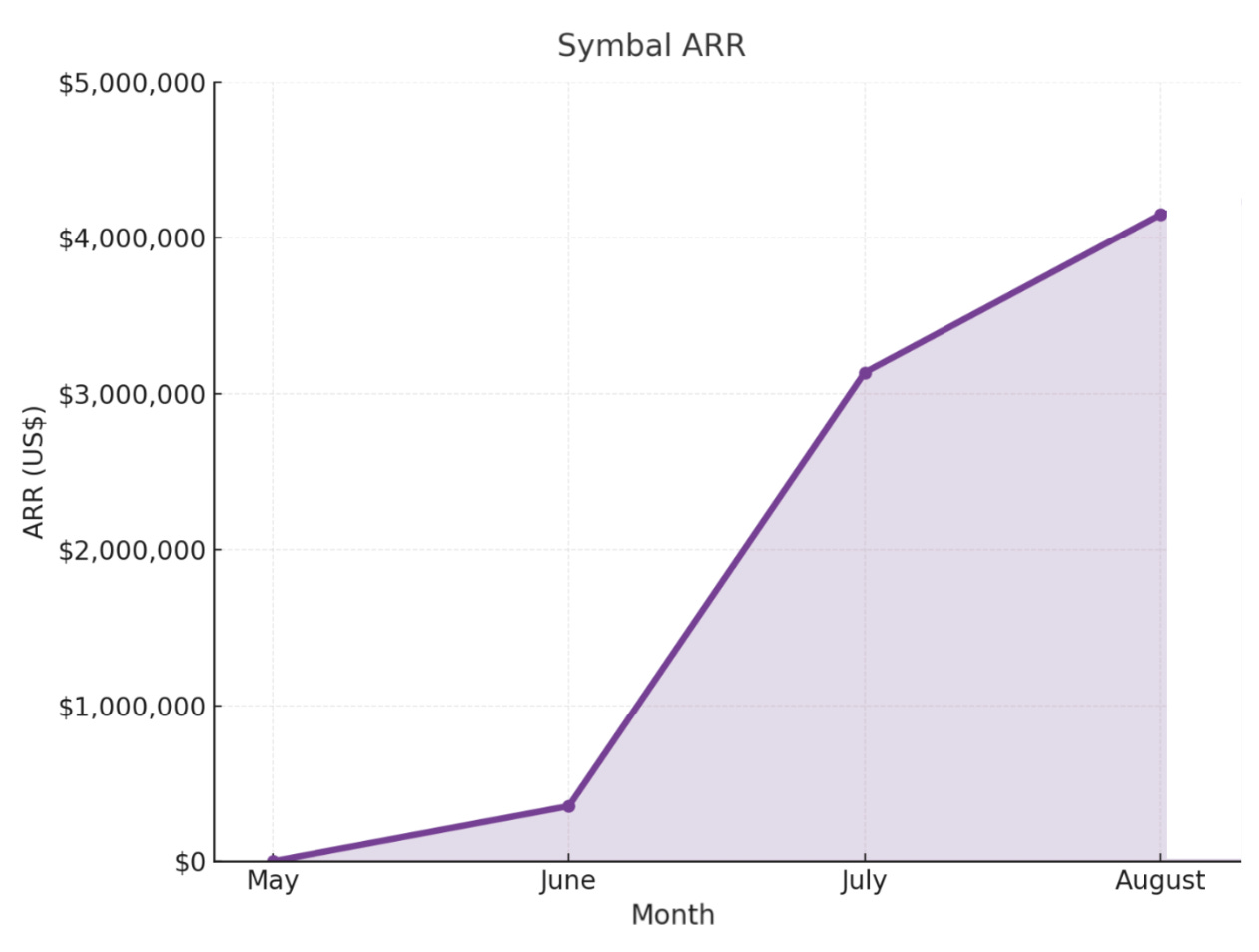Exclusive: How this 22 year-old dropout built a $4.4M Lean AI Native company with only 1 employee

He is now a serious contender for the Lean AI Leaderboard with $4.4 M revenue/employee.

Meet Krishay Mukhija, the founder who started recruiting at 16 and turned childhood frustration into a recruitment revolution.
While most founders his age are still figuring out product-market fit, Krishay is serving 40+ enterprise clients, including Penn Medicine, Fortune 500 companies, and leading health systems.
The numbers:
- $3+ million revenue in less than 60 days
- 40+ enterprise customers
- 1 core employee + 5-7 rotating interns
- 100% feature request completion rate
- Sub-3-hour average resolution time
- Built for the most compliance-heavy industries
This was no overnight success or lucky break. His advantage came from 6 years of obsession with recruiting automation, starting when most kids were playing video games.
Made $120,000 in 3 days at the age of 16
Krishay got his first job at a healthcare staffing agency. They handed him a cold list of 10,000+ nurses with outdated contact information and a simple instruction:
“Call every single person on this list until someone hits.”
The traditional approach was frustrating. He had to cold-call nurses who already received hundreds of calls weekly. Most numbers were dead and response rates were terrible.
Two days in, Krishay realized nobody picks up cold calls. So he shifted to texting first with researched, personalized messages. Better, but still painfully slow: 100 texts for 1-2 responses.
That’s when he built his first automation ever. It was not some sophisticated AI, just a simple script that moved his cursor around the screen:
The automation would type out and send personalized messages without him having to do anything.
He created 5 different text templates for different nurse profiles: recent retirees, California relocations, and career changers.
The script ran through his iPhone to send blue iMessages, bypassing expensive tools like Twilio.
Within three days, he reached all 10,000 contacts. 6 nurses were interested and placed. As a result, he made $120,000 in revenue.
It blew his mind, and since then, he has been obsessed with recruiting.
From VC Sourcing to Voice AI Breakthrough
That obsession led Krishay to General Catalyst’s Creation team, where he built LinkedIn automation tools to find hidden talent among founders. His scripts identified patterns like “Indian immigrant from University of Waterloo who’s worked at Databricks” as signals of future startup potential.
But the real breakthrough came in summer 2023 when he started experimenting with voice AI. Working with basic text-to-speech architecture, his team hit a milestone nobody expected: sub-1 second latency for the entire end-to-end process:
• Speech-to-text (transcribing what the candidate says)
• Text-to-text reasoning (AI coming up with a response)
•Text-to-speech (AI saying the response back)
That’s when he knew they had something special.
The Counterintuitive Customer Strategy
While most AI companies chase easy wins, his company Symbal AI deliberately targets the hardest customers: highly regulated organizations with compliance requirements who are naturally skeptical of AI.
He thinks someone who has an uneasiness of AI is the best client for Symbal AI because they built it from the ground up for safety and empathy. His co-founder had spent years building empathetic AI for veterans’ immersion therapy (use cases where saying the wrong word could cause real harm).
Their first paying customer was Penn Medicine, the largest employer in Philadelphia and the third most prestigious academic health system in the nation.
These are organizations that don’t adopt new technology lightly, yet they chose this 22-year old over established players. This speak volumes about his work.
The Three-Person Core + Intern Model
Symbal’s structure is deliberately lean but strategically leveraged:
Core Team (3 people):
- Krishay (CEO and co-founder): Customer acquisition, success, product, change management consulting
- Pranay (CTO and co-founder): Full-stack development and AI safety
- Akash: Operations generalist who fills in all the gaps
Krishay’s work ethic and hustle are commendable. He reached out to me on LinkedIn, Twitter, email, and has a Calendly on for almost 12 hours/day, all 7 days of the week.
He took a call with me on the weekend and once late in the evening.
His Intern Strategy: 5-7 college interns at any given time, with 20+ total throughout their journey.
Every intern who joins Symbal recruits for 5 days to understand customer pain points firsthand.
He wants them to do 300 calls and have two people who are actually interested, because then they start understanding the value of 90-day attrition.
The training is intense but effective.
Clients regularly tell Krishay that their 19-year-old interns have an understanding that rivals that of a 27-year-old, 30-year-old, someone who’s been in the space for 5+ years.
The AI-First Operations Stack
Symbal runs entirely on automated workflows that would typically require entire departments:
Customer Success Automation:
- Direct Slack/Teams channels with every customer
- N8N workflows for automatic issue routing
- 100% feature request completion rate
- Average resolution time: under 3 hours
- Loom videos documenting every feature implementation
A visual representation of their n8n workflow for CSM management:

Talent Acquisition:
- AI interviewing for all interns (including a Peter Thiel-branded persona for “zero to one” style interviews)
- 100-person applicant pools from single LinkedIn job posts
- Focus on underwriting potential rather than pedigree
Sales and CRM:
- Automated pipeline tracking through N8N workflows
- AI-powered lead qualification
- Automatic email, call, and interaction logging
They use customer success as a lever for product-led growth.
When sophisticated buyers request features, 80% of the time, other customers want the same thing.
The Compliance-First Technology Advantage
While competitors avoid regulated industries, Symbal built its entire stack for compliance:
- SOC2 compliant data processing
- NYC Local Law 144 compliant
- Built-in bias detection and consistency guarantees
- “Screen everyone, then choose the best” approach vs. resume filtering
- Human-in-the-loop verification
- Raw transcripts for compliance + intelligent summaries for usability
This compliance-first approach becomes a massive competitive advantage.
Krishay positions himself as a change management consultant helping recruiters prove that AI delivers better candidates and lower attrition rates.
The Client-Driven Product Philosophy
Symbal’s product development follows the radical principle: Clients are their chief product officers.
Instead of building in isolation, they create features directly from customer requests. The result is a 100% feature request completion rate, usually implemented within 3 hours.
This approach creates a powerful flywheel. Features requested by sophisticated buyers at Penn Medicine become selling points when talking to competing health systems. What looks like custom development actually scales across the entire customer base.
The Quality Over Quantity Hiring Philosophy
Symbal’s hiring philosophy centers on underwriting potential rather than traditional credentials. Every hire must have two spikes – two areas where they are exceptionally good.
This helps them find people who can learn quickly across domains. The ability to understand two different things deeply indicates strong learning velocity.
They deliberately hire from non-traditional backgrounds. While they have interns from Stanford and Princeton, they also have equally strong performers from Tennessee and Texas A&M.
The Hidden Leverage of Student Talent
College students provide massive leverage for Symbal, but not in the way most companies use interns. These students become sophisticated sales development representatives after just weeks of training.
The secret is that these students are native AI – they’ve been using AI since high school. Combined with intensive recruiting training, they develop genuine expertise in the customer’s problems.
The emotional impact is powerful as their customers love talking to young people who are solving problems that they’re passionate about.
The three-month rotation system ensures fresh energy while preventing burnout. Students work part-time around their studies, often making calls during lunch breaks.
The Revenue Model
Symbal’s revenue model is built for compound growth through phased implementations. Rather than one-time deals, enterprise clients start with one AI recruiting unit and expand quarterly.
Sample contract structure: $100k total value deployed as quarter one implementation, quarter two expansion, quarter three full rollout. This creates predictable recurring revenue while allowing clients to validate results before expanding.
Their revenue has two components: SaaS revenue and contractor revenue (immediate).
This approach generated $3+ million in revenue in less than 60 days, with clients including Penn Medicine.
The Future of Lean AI Companies
Symbal represents a fundamental shift in how AI companies can be built. Their success proves several counterintuitive principles:
Quality beats quantity: Three exceptional people plus a strategic intern outperform large traditional teams
Customer-driven beats feature-driven: Let sophisticated buyers guide your roadmap instead of guessing market needs
Compliance beats convenience: Targeting regulated, skeptical customers creates defensible competitive advantages
Industry expertise beats general AI: Deep domain knowledge in recruiting created authentic credibility and precise product-market fit
The Broader Implications
Krishay didn’t need venture capital because he was profitable from day one. He didn’t need a large team because AI handles routine work while humans focus on high-value activities. He didn’t need traditional sales and marketing because customer-driven product development creates organic word-of-mouth growth.
This model will likely become more common as AI tools become more powerful and accessible. The barriers to building software continue falling, while the leverage available to small teams continues rising.
The future belongs to founders who can combine deep domain expertise, AI-first operations, and obsessive focus on customer success.
If you’re building in this direction and want to accelerate your progress, I’m offering limited slots for 1:1 lean AI and/or founder advisory. DM me if interested
